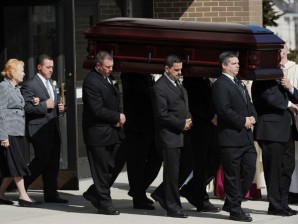OYSTER BAY—Hundreds of people gathered Monday near New York City at the funeral of famed American war correspondent Marie Colvin, who was killed while covering the uprising in Syria.

Rosemarie Colvin (L), mother of slain Times of London correspondent Marie Colvin, follows the casket of her daughter after a funeral at St. Dominic's Catholic Church on March 12, 2012 in Oyster Bay, New York. Colvin was killed in Syria along with French photographer Remi Ochlik as the two were covering the violence in the city of Homs on February 22. TOPSHOTS / AFP PHOTO / STAN HONDA
The funeral, followed by a private cremation ceremony, was held in Oyster Bay, a quiet Long Island community close to where Colvin grew up before becoming a globe-trotting reporter for Britain’s Sunday Times.
Mourners joining Colvin’s mother Rosemarie and her family included media tycoon Rupert Murdoch, owner of the Sunday Times, and John Witherow, editor of the British paper which Colvin joined in 1985.
The eulogy paid tribute to a woman who “trusted life” and “had a passion for her work.”
“Blessed are you Mary for your courage to be a voice to the voiceless,” a priest said, underlining that Colvin took huge risks to deliver on her passion.
Another prayer was said “for the many people who live in hunger and violence, especially those who live in Syria.”
Afterwards, the rose-strewn coffin was carried out of the church. It was a “beautiful service,” Murdoch said.
Witherow, meanwhile, recalled how hard it had been to get Colvin’s body out of the Syrian town of Homs, which for days after her death remained a battleground. “It took one week and involved a tremendous amount of diplomacy,” he said, praising a journalist who “will be an inspiration” for colleagues.
Friends and family had paid last respects over the weekend at a wake held at an Oyster Bay funeral home.
Colvin, 56, was a great survivor in the harsh world of war reporting, covering conflicts from Chechnya to the Arab Spring.
But she was unable to escape in the besieged city of Homs on February 22 when Syrian government rockets hit the house where she was staying along with other Western journalists.
She and French photographer Remi Ochlik were killed, while a British photographer and a French reporter were wounded.
“Marie Colvin will always be in the hearts of each and every Syrian wherever they are,” wrote a mourner named Reem Faraj on the funeral home website. “She was and will always be one of the heroes who made the cries of Syrians and other victims in the world be heard. The memories of those heroes will never die.”
“Marie, you were the bravest person I know and I don’t think you realized what an inspiration you were to us other women reporters,” added fellow Sunday Times journalist Christina Lamb.
“We will miss you. Now I’ve met your mum I know where you got it from.”
Malek Jandali, a Syrian-American attending the funeral Monday, said he wanted to salute a “beautiful soul, a courageous woman who sacrificed her life to expose the brutality of the Syrian regime.”
“We plan to have a square or a street for her in Homs,” he said.
There were also mourners from the Tamil community, which remembers Colvin for her reporting on the war in Sri Lanka, where she lost an eye in 2001, forcing her to wear an eye patch.
“She was an incredible voice for the Tamil people,” said Visuvanathan Rudrakamuran, who said he was an exiled Tamil official.
Colvin’s relatives — including her mother, two brothers and two sisters — are seeking money for the Marie Colvin Fund, which will “direct donations to charitable and educational organizations that reflect Marie’s lifelong dedication to humanitarian aid, human rights, journalism and education.”
The fund’s website is https://mariecolvin.org.
Separately, a group of activists who have formed The Marie Colvin Convoy for Freedom of Syria made a stop in Chicago on Sunday.
The activists earlier departed Los Angeles, and planned to be in New York on Thursday to deliver their condolences to Colvin’s family, before heading to Washington for a rally outside the White House.
According to the Sunday Times, Colvin survived an initial rocket strike in Homs. However, she then went out into the hall of the house to put her shoes on and it was then that another rocket struck, killing her and Ochlik.